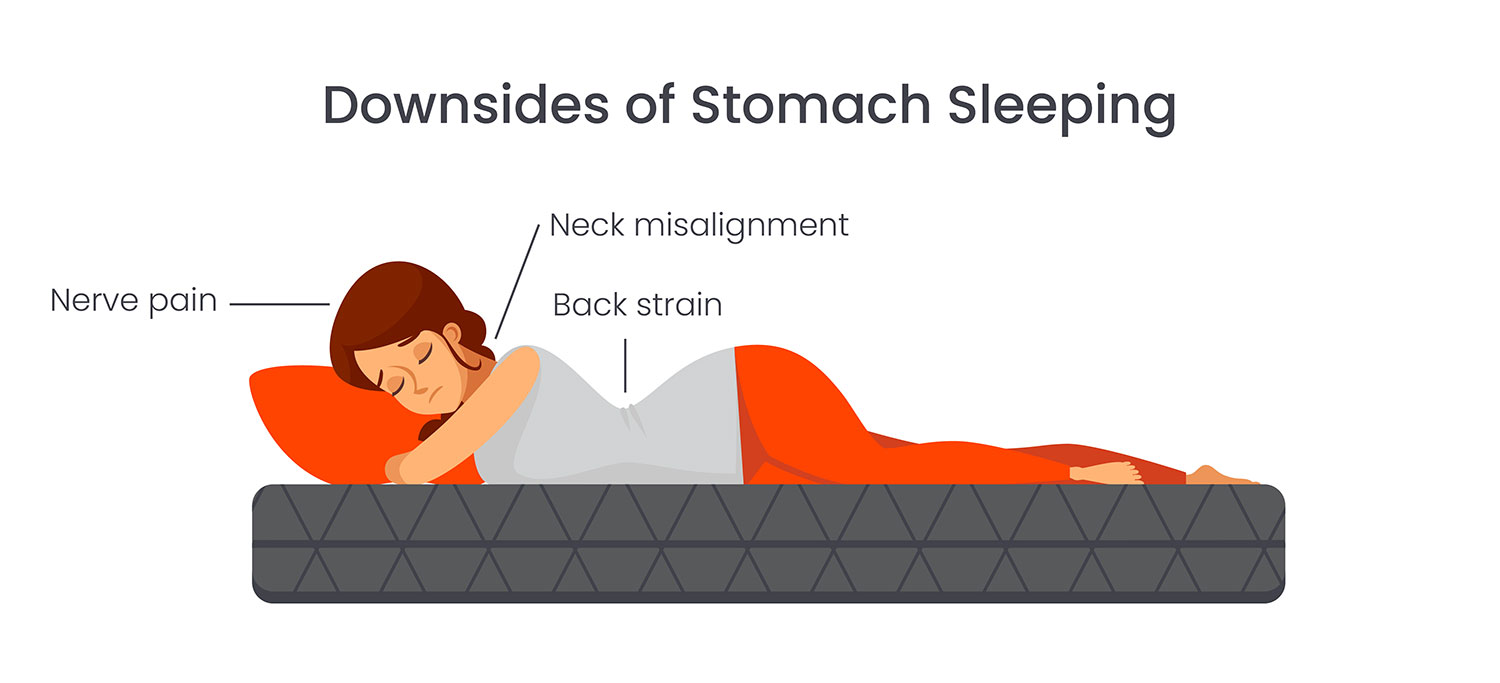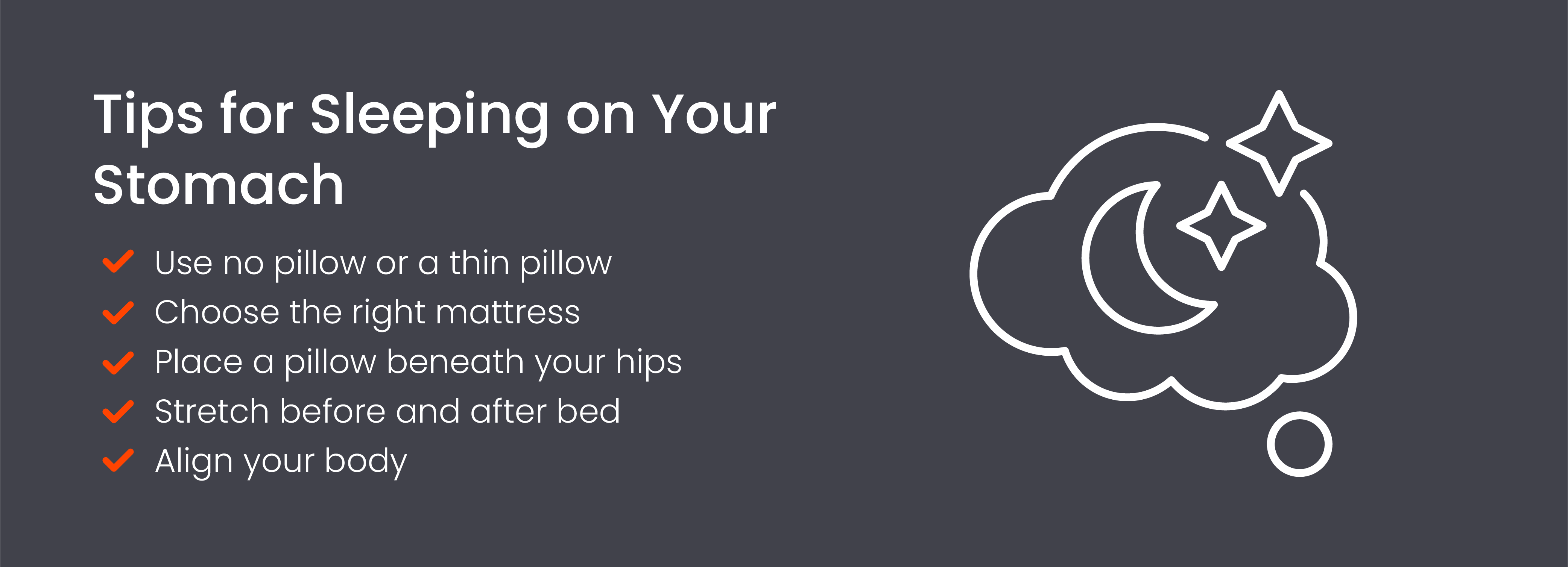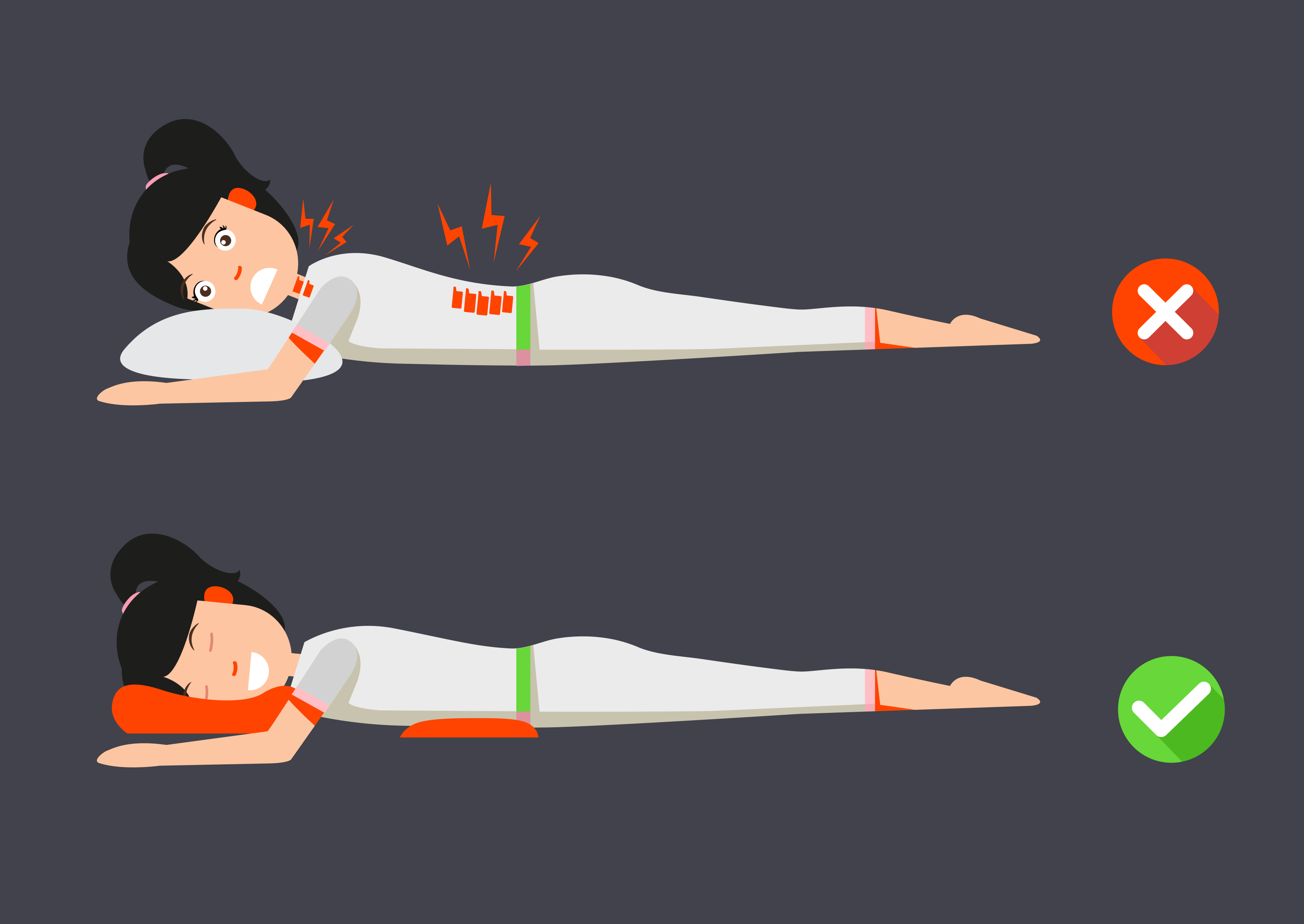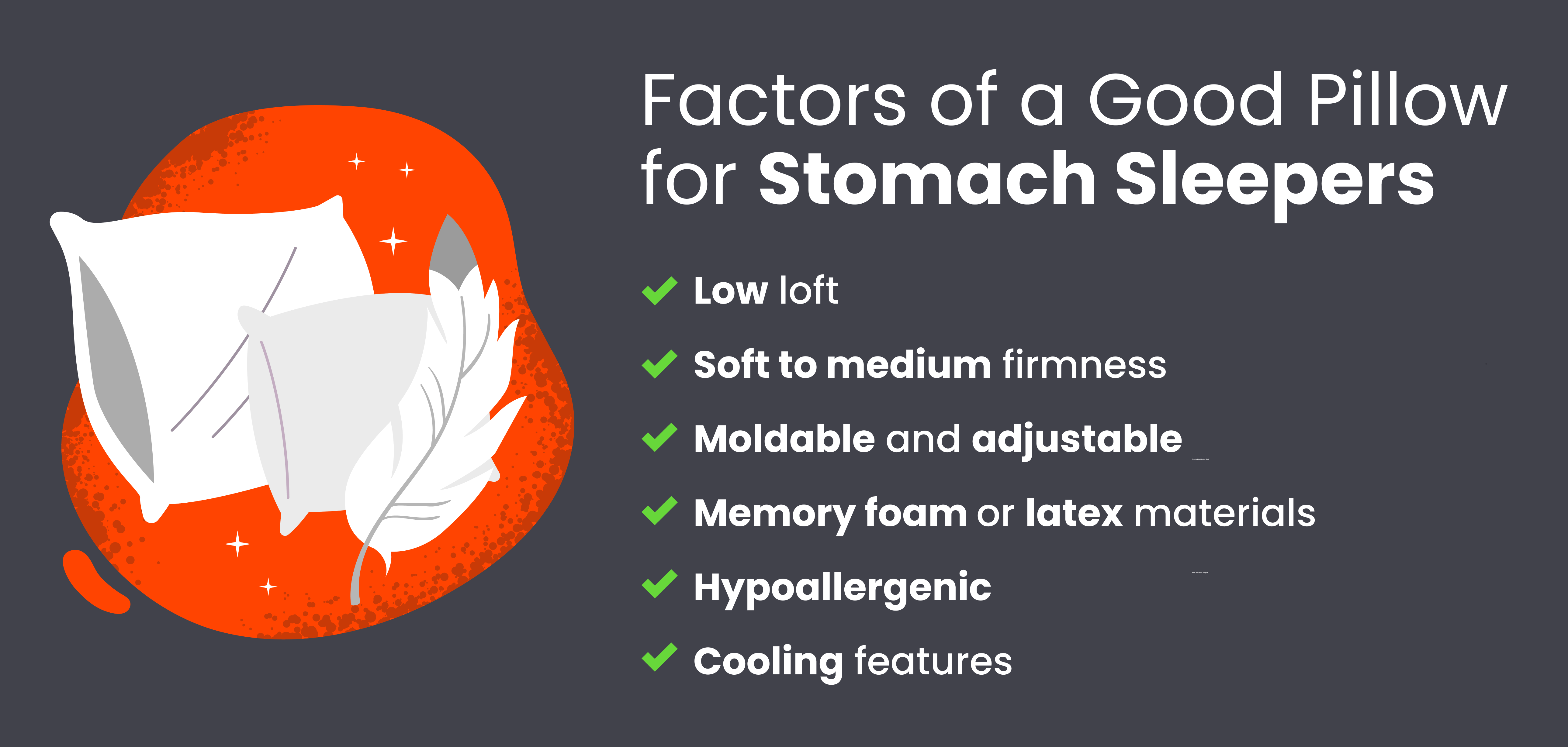Tips for Sleeping on Your Stomach

If sleeping on your stomach comes naturally, you’re almost a unicorn. A mere 16% of adults say they sleep this way.
But is it bad to sleep on your stomach? If you sleep on your belly, you might be surprised to hear what the experts have to say. Here are some tips for sleeping on your stomach (and why a copper mattress could make it a better experience), along with other stomach sleeping facts and strategies to get your best night’s sleep every night.
- Key Takeaways
- Is It Bad to Sleep on Your Stomach?
- Tips for Sleeping on Your Stomach
- Can Pregnant People Sleep on Their Stomach?
- How to Stop Sleeping on Your Stomach
- What Stomach Sleeping Might Say About You
- How to Pick a Mattress for Sleeping on Your Stomach
- How to Pick a Pillow for Belly Sleepers
- Stomach Sleeping FAQs
- Wrapping Up: Layla Sleep for Belly Sleeping Bliss
Key Takeaways
- Although sleeping on your stomach is comfortable for some, it can lead to issues such as back, nerve, and neck pain and even wrinkles.
- To improve comfort and reduce the risk of aches and pains, stomach sleepers should use a thin or no pillow, choose a firm mattress, place a pillow beneath their hips, and stretch before and after sleep.
- Transitioning away from stomach sleeping can be beneficial, especially if you wake up with aches and pains in the back and neck. Try strategies like using a body pillow or adjustable bed base or adjusting your existing pillows to help train yourself to sleep on your side or back.
- Picking the right mattress is crucial for stomach sleepers. The best mattress for stomach sleepers should be firm and contouring, such as a memory foam mattress that provides support for your hips and other pressure points.
- When picking a pillow for sleeping on your stomach, ensure it has low loft, soft to medium firmness, is moldable and adjustable, and comes with cooling features and hypoallergenic properties.
- The best sleeping position, recommended by most, is the back, as it keeps your body in a neutral position. However, not everyone is a back sleeper, and stomach sleepers can improve their sleep with other tips, such as exercising during the day, investing in quality bedding, and improving their sleep hygiene.
Is It Bad to Sleep on Your Stomach?
We wish we could tell you there were tons of pros and cons to sleeping on your stomach. Sadly, we must humbly report that sleeping on your stomach is mostly bad for you. When it comes to the best sleeping position, back sleeping takes the cake, but like any sleeping position, there are pros and cons of sleeping on your back to keep in mind.
Sleeping on your stomach is also called the prone position. When you slumber in prone, you could experience certain consequences outlined below.

Back pain
The most common complaint of people who sleep on their bellies is sciatic pain. Because most people hold the majority of their weight in their core, sleeping prone causes your middle to sink and your back to arch uncomfortably all night. This continuous strain on your back can result in persistent discomfort and pain.
Chronic back pain can significantly impact overall well-being, affecting daily activities and quality of life, especially because it can affect one’s ability to get quality sleep. Pain can lead to excessive daytime sleepiness or, worse, an inability to function throughout the day. For stomach sleepers, finding ways to alleviate this discomfort may be necessary to improve sleep quality and reduce the risk of ongoing back pain.
Neck pain
Sleeping on your stomach can also lead to waking up in pain. When you sleep in the prone position, your head and neck are forced into an unnatural angle as you face down into the pillow. This can put undue stress on these areas, resulting in morning soreness and stiffness. The pressure on your neck and shoulders can disrupt your sleep and make it challenging to maintain a comfortable sleeping posture.
Nerve pain
Your spine is basically nerve central to your body. Causing any sort of distress or pinching along your spinal column (which may happen when sleeping on your stomach) could lead to referred pain in almost any part of your body. Unfortunately, nerve pain can be challenging to manage and typically requires adjustments in your sleeping position, switching to supportive bedding, and a consultation with a healthcare professional.
Wrinkles
This one is a bit vain, but hey, we all care about our faces. Sleeping on your side and stomach can have the unwanted side effect of creating more wrinkles on your face due to the constant pressure and friction against your pillowcase and bedding. If you’re not into starting Botox early (or ever), you may want to sleep on your back instead.
On the positive side, Hennepin Healthcare points out that sleeping on your stomach could be good for people who have sleep apnea or snoring. Lying on your stomach helps keep your airways open, reducing the likelihood of snoring and potentially improving sleep quality for those with these issues.
Sleep apnea and snoring are common sleep-related concerns that can have a significant impact on both the individual experiencing them and anyone they share their bed with. If you have sleep apnea or snoring issues, experimenting with different sleeping positions may help alleviate these concerns and promote better sleep quality.
Tips for Sleeping on Your Stomach
We don’t mean to completely turn you away from stomach sleeping. It’s not all bad news. If prone is truly the most comfortable position for you, you aren’t destined for a life of morning back pain and ibuprofen popping. Here are some tips for how to sleep on your stomach while getting rid of back pain that often accompanies this position.

1. Use a thin pillow
Opt for a thin pillow to keep your head in a more neutral position. Layla’s pillows are a great example, as they come with removable fill, allowing you to adjust the loft or height to your preference. This ensures your neck remains properly aligned with the rest of your body, reducing the risk of morning discomfort.
A study found that certain types of pillows can help you sleep better and reduce neck pain. These include memory foam or latex pillows and those with a special shape designed for particular sleeping positions, like those that are higher on the sides for side sleepers and flatter in the middle for back sleepers.
Because stomach sleepers put so much pressure on their necks, it’s typically best to use a very thin pillow to minimize strain. This helps keep your neck in a more natural position while you sleep, reducing the likelihood of waking up with discomfort or pain.
2. Use no pillow
You may want to skip sleeping with a pillow altogether. This allows you to keep your neck better aligned with the rest of your body. Resting on your stomach with your head on a tall pillow forces your neck back and causes upper body pain in the morning.
3. Choose the right mattress
Selecting the right mattress is crucial for ensuring a comfortable sleep experience, especially if you’re experiencing pain. Your mattress should provide adequate support and help maintain proper spinal alignment. Look for a mattress that suits your specific needs. For instance, stomach sleepers may prefer a firmer mattress to prevent their midsections from sinking into the mattress, causing an arch in their backs all night. Additionally, those with severe back pain or conditions might look for a mattress for scoliosis to provide the right amount of support.
Sleeping on a memory foam mattress with medium firmness can provide more quality sleep and has been proven to potentially relieve musculoskeletal pain in older adults living in care facilities. Participants in a study also found that they fell asleep easier on foam mattresses compared to firmer ones.
Layla’s memory foam mattresses are crafted with layers of premium memory foam, offering just the right amount of firmness depending on your preferences. With flippable firmness, you can find which side works best for you — soft or firm. Our mattresses can promote better sleep quality while helping you find the right level of firmness to ease your pain.
4. Place a pillow beneath your hips
While there’s limited research on sleeping positions and overall pain, poor sleep posture may impact sleep quality and cause back pain. Specifically, one study reported increased symptoms when participants slept in prone or ¾ side-lying positions.

The Mayo Clinic recommends sleeping with a pillow beneath your pelvis while you sleep on your stomach. This supports your hips and keeps your spine better aligned. Place the top of the pillow on your lower abdomen; the bottom of the pillow will hit about mid-thigh.
5. Stretch before and after bed
Incorporating some gentle stretching exercises into your bedtime routine can help alleviate muscle tension and neck stiffness. Simple stretches can promote flexibility and improve overall comfort during sleep.
Overall, studies have demonstrated that incorporating stretching into your bedtime routine can have positive effects on sleep quality and overall comfort. For example, research has found that both resistance exercise and stretching can decrease insomnia severity and improve sleep quality.
Additionally, stretching before bed has also been associated with a reduction in leg cramps in older adults.
6. Align your body
Sleep posture or position can affect your spinal health and overall quality of sleep. Poor sleep posture has been linked to waking neck and lower back symptoms. Certain sleeping positions, like the prone position, may increase mechanical loads on the spine, potentially worsening spinal pain.
If your sleep position causes pain or discomfort, it could lead to poor sleep quality, characterized by delayed sleep onset, frequent awakenings during the night, and increased total wake time.
Try sleeping with your forehead angled toward the pillow instead of with your head turned to the side. This is better for your upper vertebrae, reducing the strain on your neck and shoulders.
Can Pregnant People Sleep on Their Stomach?
Sleeping on a belly is one thing when you’re not pregnant. It’s quite another when you’re expecting. Sooner than later, the position will become impossible. If you’re sleeping with a bun in the oven, most doctors recommend you sleep on your side.
Sleeping on your left side has particular advantages. It improves blood flow to vital organs, including the heart, uterus, and kidneys. You may also switch to your right side from time to time so you don’t put too much stress on one shoulder.
How to Stop Sleeping on Your Stomach
For many people, sleeping on their stomachs is a comforting and familiar position. It may have been their preferred way to sleep for years, providing a sense of security and relaxation. However, as cozy as it may feel, stomach sleeping can lead to various health issues and discomfort, from neck and back pain to facial wrinkles. If you’ve decided it’s time to transition to a different sleeping position, it’s important to do so gradually and with a thoughtful approach. Here are a few strategies to help you stop sleeping on your stomach:
- Make a gradual transition: Switching your preferred sleeping position is not something that typically happens overnight. Your body and mind are accustomed to sleeping on your stomach, and sudden changes can be challenging. To make the transition easier, consider starting by gradually altering your sleep posture. This might involve shifting slightly to your side or back while incorporating some stomach sleeping. Over time, you can decrease the amount of time spent on your stomach until you’re comfortable with a new position.
- Use a body pillow: A body pillow can help you stop sleeping on your stomach. Cradle it while you sleep to create a natural barrier that prevents you from turning over onto your stomach during the night. The comforting support of a body pillow can also help you adjust to side or back sleeping. By embracing a hugging or spooning position with the body pillow, you can simulate the cozy feeling you might be used to from stomach sleeping.
- Adjust your pillows: Proper pillow adjustment is crucial when transitioning away from stomach sleeping. If you’re moving to side sleeping, make sure your pillow fills the space between your head and the mattress, maintaining good spinal alignment. For back sleeping, opt for a thinner pillow or one that provides support under your neck. Pillow contour and loft play a crucial role in keeping your spine in a neutral position and preventing discomfort.
- Create a comfortable sleeping environment: The right sleep environment can significantly impact your transition away from stomach sleeping. Consider investing in comfortable bedding and a memory foam or hybrid mattress to support your new sleeping position. Keep your room cool, dark, and well-ventilated to promote a peaceful sleep environment. Relaxation techniques, such as deep breathing exercises or calming music, can also help ease the transition and improve sleep quality.
- Use an adjustable bed base: An adjustable bed base allows you to elevate your upper body and legs to various positions, making side or back sleeping more comfortable. By adjusting the bed to a slight incline, you can minimize the inclination to roll onto your stomach during the night. Additionally, adjustable bed bases can alleviate pressure points, providing extra comfort in your new sleep position.
- Address underlying discomfort: Sometimes, the desire to sleep on your stomach may stem from an underlying discomfort or pain you’re attempting to alleviate. If you’re experiencing persistent discomfort in your current sleep position, consult a healthcare professional. They can help identify the source of your discomfort and recommend potential remedies or treatments.
- Stay consistent: Consistency is key to successfully transitioning to a new sleep position. Maintain a routine and a regular sleep schedule to reinforce your efforts. The more consistent you are in practicing your new sleep position, the quicker your body and mind will adapt to the change. It’s normal to experience occasional setbacks, but don’t get discouraged. Be patient and persistent.
What Stomach Sleeping Might Say About You
What does sleeping on your stomach say about you? Personality assessments based on sleep poses could be somewhat like horoscopes. You either believe them, or you don’t.
But, no matter where you fall on the scale from scientific to an avid horoscope enthusiast, it’s interesting to consider what sleeping on your stomach might say about your personality. As it turns out, you may have some things in common with other people who also choose to lay down stomach-first.
What do sleeping on your stomach and personality traits have in common? There may be some patterns that connect the two. According to a recent article, people who sleep prone have some shared traits. These traits/habits include:
- Feeling like you have little control over your life. Are you holding onto your mattress for dear life because you can’t change significant aspects of your daily life? According to Phipps’ study, he found that a lot of people are lying down in a freefalling position because that’s how they feel while they’re awake.
- Waking up with more anxiety than the average person. The expert says stomach sleepers tend to wake up feeling like they still have unfinished business from the day before. Are you trying to bury your worries in your mattress by face planting into bed every night?
- Being somewhat defensive. People who sleep on their stomachs might have a harder time accepting criticism, according to the study (though, to be fair, who likes being told they’re wrong?). Either way, stomach sleeping is definitely the most defensive sleeping posture because you’re instinctually protecting the front of your body.
How to Pick a Mattress for Sleeping on Your Stomach
Have you decided that when it comes to sleeping on your stomach, back pain is just a part of the deal? Not so fast, partner.
If you choose a different mattress, you may be able to sleep comfortably in the prone position. When it comes to choosing the best mattress for stomach sleepers, a few key factors need to be considered to ensure a good night’s rest.
Good mattresses for sleeping on your stomach are firm and contouring. The firmness prevents your body from sinking too far into the bed, and the contouring protects your hips and other pressure points. When your body sinks excessively, it can lead to an unnatural curve in your spine, causing discomfort and potential back pain.
At the same time, you need a mattress that offers proper contouring to accommodate the natural curves of the body, especially around your hips and pressure points. The right level of contouring helps in maintaining spine alignment and prevents the development of new pressure points, which can lead to discomfort over time.
So, memory foam vs. spring mattresses. Which one has you sleeping light as a feather on your stomach, and which leaves you stiff as a board? We’re partial to high-quality memory foam. A good memory foam mattress supports your pelvis while giving way for your head (which will be laying directly on the mattress if you forgo a pillow). Memory foam offers a unique ability to adapt to your body’s contours, ensuring the spine remains in natural alignment throughout the night. This prevents excessive arching of your back and minimizes the risk of waking up with back pain or discomfort.
Memory foam mattresses also come in varying degrees of firmness, allowing you to choose one that suits your individual comfort preferences. This flexibility in firmness levels ensures that stomach sleepers can find a memory foam mattress that provides the right balance of support and comfort.
Keep in mind that you’ll naturally trap heat beneath your body when you sleep on your stomach, so you want a mattress that wicks heat away. Materials like copper-infused memory foam prevent you from overheating and waking up cranky. Copper is known for its thermal conductivity, which helps wick away heat from your body, preventing you from overheating.
How to Pick a Pillow for Belly Sleepers
As we’ve mentioned, sleeping on your stomach may mean not using a pillow. You can keep your neck aligned with your back when you sleep right on the mattress. But old habits are hard to break. And pillows are a comfort for many sleepers.
If you want to continue to sleep with a pillow, make sure you’re being selective. You want a flat-ish pillow that still supports your neck. It’s a tall order, but it’s not impossible. Ideally, you’ll be able to adjust the height of the pillow by removing some of the fill as needed. Here are some key considerations when picking a pillow for belly sleepers:

- Low loft: Stomach sleepers typically require a low-loft pillow, which means it’s relatively flat and not too thick. A low-loft pillow helps keep your head and neck in a more neutral position, reducing strain on your neck and spine.
- Soft to medium firmness: Opt for a pillow with a soft to medium firmness. A soft pillow provides comfort and minimizes pressure points on your face, while medium firmness ensures adequate support. Finding the right balance is crucial for maintaining proper alignment of your head, neck, and spine.
- Moldable and adjustable: Consider moldable and adjustable pillows. These pillows allow you to customize the loft and firmness to your liking. Some come with removable inserts or fill, enabling you to tailor the pillow to your specific needs.
- Material matters: Memory foam and latex pillows can be excellent choices for stomach sleepers. Memory foam pillows conform to the shape of your head and neck, providing support and comfort, while latex pillows offer a responsive and supportive surface
- Hypoallergenic and easy to clean: Stomach sleepers may benefit from hypoallergenic pillows that resist allergens like dust mites and allergenic materials. Additionally, consider a pillow with a removable and washable cover to help keep your sleeping environment clean and free of allergens.
- Cooling features: Stomach sleeping can trap heat, so look for pillows with cooling features like breathable fabric and fill to help regulate your body temperature.
Stomach Sleeping FAQs
What is the best sleeping position?
Back sleeping is considered the best position for most people. This is because sleeping on your back allows your body to rest in a healthy, neutral position, which can help reduce pressure points and reduce the risk of neck and back pain.
Sleeping on your back also promotes proper alignment of the spine, which can alleviate strain on muscles and joints. Some benefits of back sleep include reduced acid reflux symptoms, decreased wrinkles on the face, and better spinal alignment.
Side sleeping can also be a good option, especially for those who may experience discomfort while sleeping on their back. Side sleeping can alleviate snoring, reduce acid reflux symptoms, and promote better circulation. It’s especially beneficial for pregnant women. Sleeping on your left side specifically is the best position for all of the above because it takes pressure off your internal organs, promotes healthy blood flow, and aids in digestion.
In contrast, stomach sleeping is generally considered the least ideal position for most people. While some may find it comfortable, stomach sleeping can cause serious neck and lower back strain, leading to muscle stiffness and discomfort.
How can stomach sleepers improve their sleep?
In addition to the tips for sleeping on your stomach we’ve already provided, stomach sleepers can take several steps to enhance their sleep quality beyond simply adjusting their sleeping position. A few options include:
- Improving sleep hygiene: Sleep hygiene is the activities you perform that can improve overall sleep quality. Go to bed and wake up at the same time every day to help your body learn when it’s time to settle down and wake up again. Create a relaxing, sleep-promoting bedtime routine, such as taking a warm bath, reading a book, or practicing relaxation techniques to help the body and mind wind down for the night.
- Exercising during the day: Regular activity during the day can help you sleep better at night. Exercise reduces stress and tension, making it easier to fall asleep and stay asleep. However, you may want to consider avoiding vigorous exercise too close to bedtime since it can provide you with a boost of energy.
- Invest in quality bedding: The right bedding can make a huge difference in sleep comfort for stomach sleepers. Opt for breathable and comfortable bedding materials, such as bamboo sheets, to improve your comfort and prevent you from getting too hot at night.
Does stomach sleeping stop snoring?
Stomach sleeping can potentially reduce snoring by helping to keep the airways open throughout the night while also alleviating pressure on the chest and lungs for easier breathing. However, stomach sleeping isn’t typically recommended as a solution to snoring because of the potential for it to cause neck and back strain. Side sleeping, on the other hand, is often considered a healthier sleeping position that can also prevent snoring by keeping the airways open.
Wrapping Up: Layla Sleep for Belly Sleeping Bliss
If you’re not happy with your current bed, we welcome you to try a Layla mattress. Our 2-in-1 memory foam mattress can be a firm or soft mattress, depending on which side you flip to the top.
Our copper-infused foam keeps you clean and cool while you sleep, and the low-density layer rebounds quickly if you move around a lot at night. Our pillow is even customizable. You can just remove some of the fill until it’s low enough to make sleeping on your stomach comfortable.
What are you waiting for? Give our mattress and Kapok Pillow a try and if you don’t absolutely love them, return them for a full refund…but you’re gonna love ‘em.







